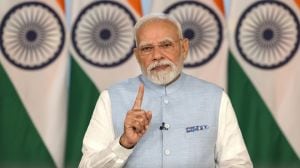TISS such a pity! Student project makes a point
March 8: The corridors are aflame with sunflower yellow chartpaper that speaks of a churning within. Cast in bold black typeface, the mess...

March 8: The corridors are aflame with sunflower yellow chartpaper that speaks of a churning within. Cast in bold black typeface, the messages are as provocative as they are insistent on reforms within the country’s premier institute offering a post-graduation degree in social sciences.
Ninety first year students enrolled for the Master in Social Work (MSW) course at the Tata Institute of Social Sciences at Govandi have assumed the onus of getting the authorities to do some soul-searching while raising several poignant issues — through their campaign/project work for their course in Communication and Introduction to Audiovisual Media. The three topics, selected by the students themselves, are `Right to Information,’ `Health at Hand’ and `Hostel Facilities’.
Seizing the moment, this is what the students had to say: That it is ironic that a social work institute, especially TISS, does not have a counsellor; that there is no full-time doctor; and, yes, the communication between the students and administrative authorities has grown increasingly opaque over the years.
One of the posters, appropriately crimson, screams from the entrance: `67.44 per cent of the students feel the need to have a counsellor on campus’. Another rues: `61.70 per cent of the students are forced to access medical facilities outside campus’. Explaining the dire need, a student says: “Though a doctor does visit thrice a week, we want a resident medical officer. After all, illnesses don’t always afflict us on the same three days.”
On the need for a full-time counsellor, one of the students explains: “It is surprising that an institute which speaks of the correlation between a healthy mind and a healthy body does not have a counsellor. We live away from our families. We have our frustrations. Certainly, we cannot confide everyting in our faculty members.”
Concerned that decision-making is not the transparent process it ought to be, students point out that the authorities have shut the door to dialogue. Voicing this concern, a poster says: `I demand an audience with the director/register at least once a month at a students’ forum’. Yet another wants `a noticeboard to put down our queries and demands’. Others, which draw on surveys among the students, harp on the transparency issue: `Do you know if a no-objection certificate has been issued for the PhD hostel,’ asks a poster in the hallway. The answer was disconcerting: 77 per cent of them had `no idea’. The questions are relentless. `Do you know why first year students were refused and then allowed to go to Orissa?’ But 60 per cent had `no idea’. And get this: Not a single student surveyed could say which the highest decision-making body at TISS was and how often it is convened!
A letter signed by the students and tacked to the foyer wall is much more strident. Dated February 2000, it reads: “To whom it may concern… “We, the students of TISS, feel that our institute just does not follow the policy of democratic functioning and transparency in decison-making . It is ironic indeed that the institute is held in high esteem in the public eye, for standing by their very ideals…”
Some senior students told Newsline that a former director of the institute, for instance, refused to speak to them when they sought an audience with him about a pressing matter. Adds a junior student: “We are yet to receive any notices or circulars, say, on decisions by any committee meetings. We know we are not competent to comment on everything. But things that dirctly affect us must be revealed to us as well.”
Asked to comment on the unique mode of protest, Registrar, Dr S K Bandopadhyay, passed the buck to the officiating director, Dr Jacob Aikara. “It is an academic matter and therefore faculty members should be answering you,” Aikara told Newsline. Head of the Media and Communication unit, Dr Anjali Monteiro, says: “It is a graded assignment. So I reserve my comment.”
But if under fire for not fully honouring the Right to Information, the institute gets full marks for Freedom of Expression. “The authorities, after all, have given us the green signal for the project, even though it is critical of them,” admits a student.
And they are not the only one’s whose grades just went up. “When we sought an appointment with the registrar and officiating director the other day, we were pleasantly surprised at the forthcoming response,” beams another. With a small though perceptible difference in the status quo, full marks for the students as well.
Photos





- 01
- 02
- 03
- 04
- 05

























